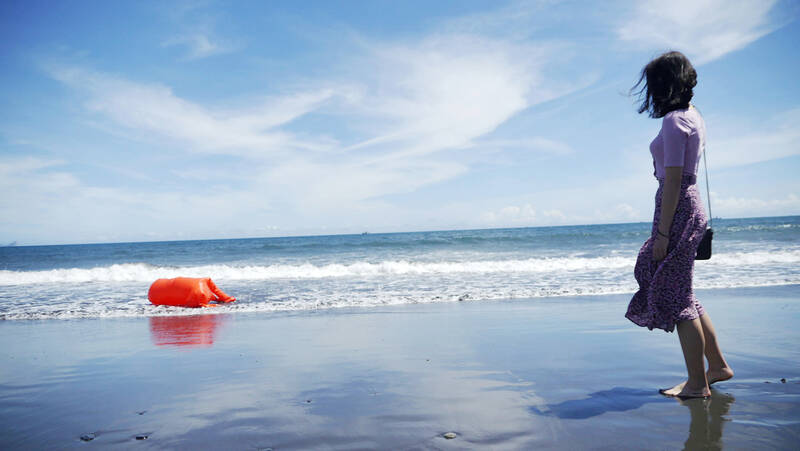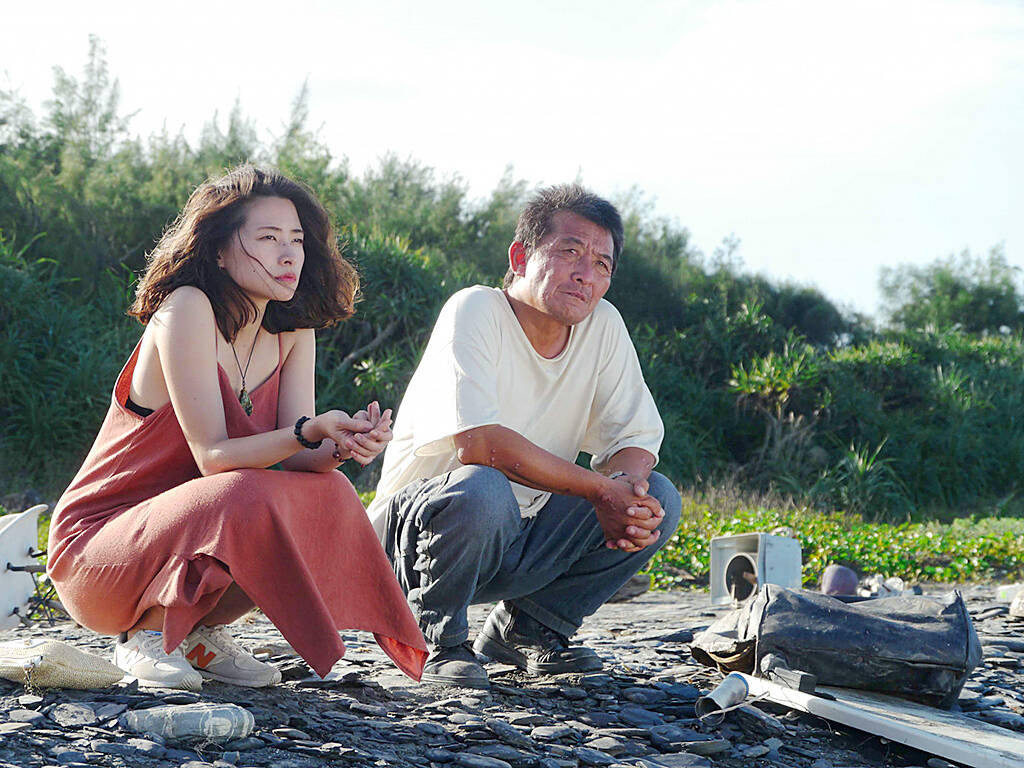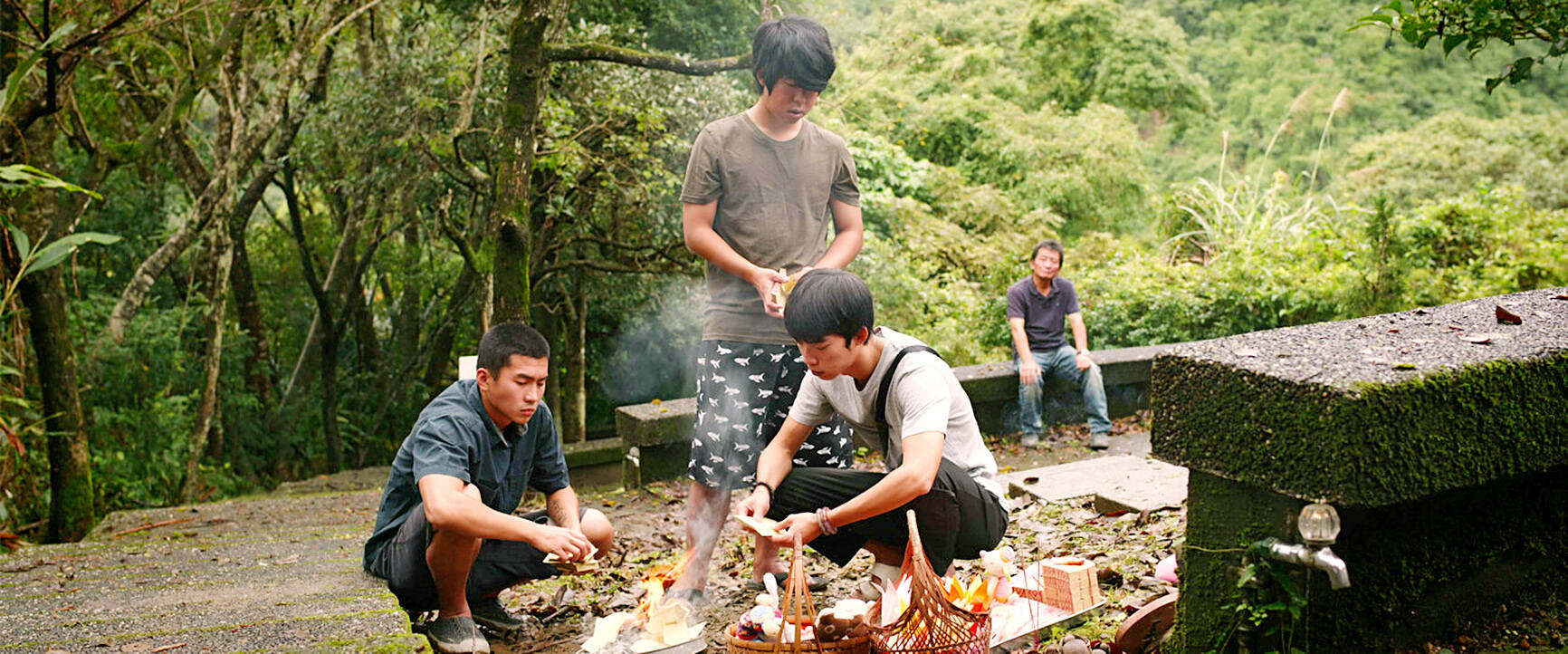From an outsider’s perspective, things are quite grim for the Chen family. Set in perpetually-rainy rural Yilan County near the beach, this subdued drama revolves around youngest son A-liang (Tung Liang-yu, 董亮宇), who performs odd jobs and devotes himself to taking care of his mentally disabled elder brother A-ting (Chung Shang-ting, 鍾尚庭). He’s also a talented artist whose bedroom walls are plastered with his drawings.
Meanwhile, eldest son A-wei (Wu Wei-han, 吳威翰) engages in questionable activities and rarely comes home, and the stern, silent yet sensitive father A-ming (Chen Ming, 陳銘) tries his best to keep the family afloat while his wife is in the hospital.
The natural beauty of their surroundings is mostly littered with trash, and A-liang and A-ting spend their days playing baseball among the debris, catching fish in the dirty pond and scavenging junk washed up on the beach.

Photo courtesy of Golden Horse Film Festival
But somehow, their situation does not come off as pitiful nor sad. They may not seem to have much to look forward to, but they’re not exactly struggling either. Like his previous film Synapses (那個我最親愛的陌生人, reviewed on Nov. 28, 2019), which deals with dementia and memory loss, director Chang Tso-chi (張作驥) presents the story through extended vignettes of the family’s daily interactions. Flotsam and Jetsam (夏日天空的那匹紅馬) goes more into detail with their mundane activities and has even less of a clear plot, but what’s different is that it doesn’t dwell on hopelessness and despair. It’s even heart-warming at times.
Nothing dramatic happens to the family and the characters don’t express themselves very well, if at all, but it’s clear that they care deeply about each other. The father and two younger sons eat dinner together every day, and while the conversation mostly consists of things like “eat more vegetables, don’t just eat meat” and “don’t drink too much alcohol,” their bonds are evident. Even the wayward eldest son tries to provide for them and shows up when it’s time to visit the bedridden mother.
One of the more poignant scenes is when A-zhen (Fox Lee, 李亞臻), a young woman who barges into their lives, attends A-ting’s birthday party and expresses her envy for what the family has. And the brief conversation with A-liang that ensues is one of the very few moments where he talks about how he really feels. A-ting gets drunk that night and poops his pants, and while A-liang scolds him and grumbles, he still cleans up after his brother and they head out together again the following day, with A-ting clutching onto the back of A-liang’s shirt.

Photo courtesy of Golden Horse Film Festival
A-zhen’s side-story of longing and searching provides some drama and distraction from the monotony of the all-male household, and her animated, gangster-ish ex-boyfriend (Huang Huai-te, 黃懷德), who raps at a local night market, provides absurdist comedic relief. Chang could have expanded more on A-zhen’s background, as there are several scenes that are confusing and unclear. It would also give a bit more color (literally, as she wears bright clothes compared to the others) to the story.
While many Taiwanese films of this genre focus on family conflict and dysfunction, there’s little bitterness or complaints (although a lot of nagging) in Flotsam and Jetsam. The central motif in the film, as the Chinese title indicates, is a giant inflatable red horse, and it seems to represent the bit of hope that the characters manage to hold on to, no matter how hard things get.
It’s not the easiest film to watch as one constantly wonders if the plot is going anywhere, and many of the subtle details only sink in afterward. But it’s beautifully shot (even the garbage-filled scenes are somehow poetic) and edited, with a fitting emotional soundtrack that amplifies the mood.

Photo courtesy of Golden Horse Film Festival

Taiwan has next to no political engagement in Myanmar, either with the ruling military junta nor the dozens of armed groups who’ve in the last five years taken over around two-thirds of the nation’s territory in a sprawling, patchwork civil war. But early last month, the leader of one relatively minor Burmese revolutionary faction, General Nerdah Bomya, who is also an alleged war criminal, made a low key visit to Taipei, where he met with a member of President William Lai’s (賴清德) staff, a retired Taiwanese military official and several academics. “I feel like Taiwan is a good example of

March 2 to March 8 Gunfire rang out along the shore of the frontline island of Lieyu (烈嶼) on a foggy afternoon on March 7, 1987. By the time it was over, about 20 unarmed Vietnamese refugees — men, women, elderly and children — were dead. They were hastily buried, followed by decades of silence. Months later, opposition politicians and journalists tried to uncover what had happened, but conflicting accounts only deepened the confusion. One version suggested that government troops had mistakenly killed their own operatives attempting to return home from Vietnam. The military maintained that the

Jacques Poissant’s suffering stopped the day he asked his daughter if it would be “cowardly to ask to be helped to die.” The retired Canadian insurance adviser was 93, and “was wasting away” after a long battle with prostate cancer. “He no longer had any zest for life,” Josee Poissant said. Last year her mother made the same choice at 96 when she realized she would not be getting out of hospital. She died surrounded by her children and their partners listening to the music she loved. “She was at peace. She sang until she went to sleep.” Josee Poissant remembers it as a beautiful

Before the last section of the round-the-island railway was electrified, one old blue train still chugged back and forth between Pingtung County’s Fangliao (枋寮) and Taitung (台東) stations once a day. It was so slow, was so hot (it had no air conditioning) and covered such a short distance, that the low fare still failed to attract many riders. This relic of the past was finally retired when the South Link Line was fully electrified on Dec. 23, 2020. A wave of nostalgia surrounded the termination of the Ordinary Train service, as these train carriages had been in use for decades